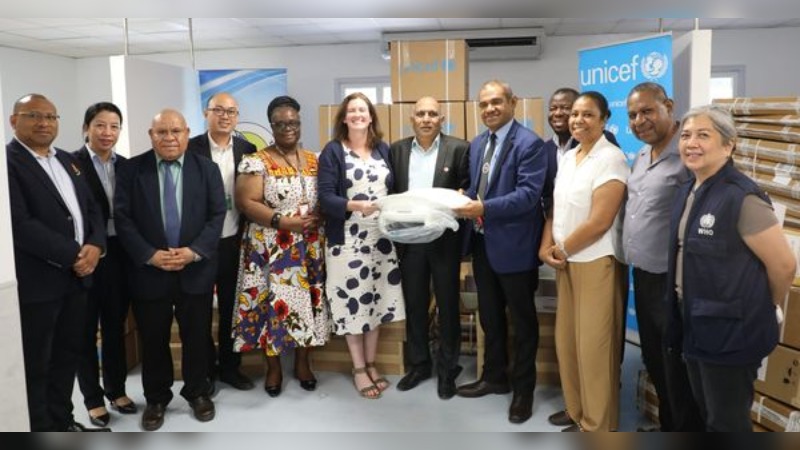The Port Moresby General Hospital’s Special Care Nursery were proud recipients of 6 boxes of newborn care kits including various medical equipment from UNICEF.
UNICEF presented the newborn kits containing 3 doppler foetal heart detectors, 9 resuscitators, neonate set, 3 electrical baby scales, 6 drip stands, 9 bulb suction reusables, 30 tape measures and 20 thermometers in a special ceremony on Friday 15th April.
Various medical equipment included 10 pulse oximeter, 15 Neonatal Stethoscopes, 3 Warmer system newborn radiant with accessories, 2 Ventilators, 2 Phototherapy Unit with Accessories, 4 Bubble CPAP Machines, 2 Portable Ultrasound Scanning System including Cardiology and 2 Sony Digital Printers.
PMGH Director of Medical Services, Dr. Koni Sobi said, through collaboration with partners and stakeholders, they can drive and improve the health indicators in this country.
“We just can’t do it alone. The government of this country can’t do it alone. We need the collaboration of everyone, all the partners in healthcare, in private, in the community. We all need to work together to realize good outcomes as far as health care is required in this country.”
UNICEF, Chief of Health, Dr Satish Gupta spoke of the collaboration with the National Department of Health to strengthen neonatal services in the country.
“The first day of life is the most important in the life of a child. When the delivery takes place, the first 24 hours and the first 72 hours are the most critical for the survival of a newborn and if we can provide good care services at the facility we can reduce mortality in the country.”
He also presented on the newborn care program to strengthen quality newborn care at the community and facility level through capacity building, providing critical equipment and having a mentorship program to provide on the job building for Paediatric and O&G societies.
Dr Osborne Liko, Secretary for Health acknowledged the roles that each partner and stakeholder plays and the teamwork and support towards neonatal care.
“We are working with partners to build the capacity of our health facilities so that they are able to manage newborn complications which includes the needs of the premature babies.”
“And this includes effort focused on upgrading some health facility and providing equipment for newborn care and health care workers working in special newborn care nurseries and trained to manage complications associated with the premature deliveries,” Dr Liko said.
He added that the newborn care kits received provide the necessary tools at the primary healthcare levels across 22 provinces and to support newborn deliveries and care.

